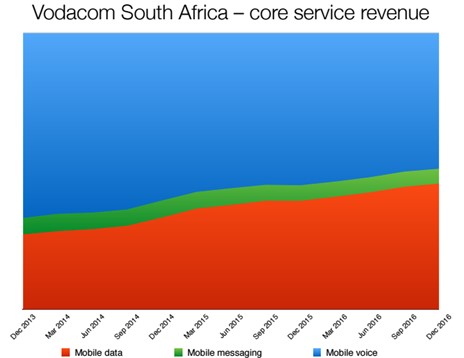Voice has slipped to below 50% of ‘core’ service revenue for the first time ever.

In the current quarter, data revenue should overtake that which Vodacom’s South African operation derives from voice services. In the company’s third quarter, data service revenue in South Africa totaled R5.473 billion, compared to voice revenue of R5.892 billion.
Of course, this should be no surprise as the voice market (globally) is in structural decline, but it has historically been such a huge chunk of service revenues that even with >30% year-on-year growth rates in data revenues, it’s only just dipped below 50% contribution overall (among the core of voice, messaging and data).
Another way of looking at it is to average out the revenue over the course of a quarter. Vodacom generated on average R59.4 million in revenue from data per day between October 1 and December 31 2016. In that same time, voice revenue was on average R64 million per day, while messaging was barely R7 million.
In that most recent quarter, data now comprises 46% of Vodacom’s local operation’s overall core service revenue, i.e. excluding interconnect and “other”. It’s been growing exceptionally quickly, at around the 20% mark in 2014, before accelerating to more than 30% in 2015. In the past 12 months, data revenue growth has averaged 20% but there has been an acceleration (year-on-year) in the last three quarters. Even on a quarter-by-quarter basis, growth has been 6% in the past 24 months (the last quarter-on-quarter decline (-2%) was more than 30 months ago).
If current trends hold, Vodacom will have doubled its data revenue in South Africa over three years. In late 2013/early 2014, data was about 40% of voice revenue.
Of course, operators don’t disclose profitability/margins of various services but voice has historically enjoyed far better margins than data. Margins have – generally – been declining globally as subscribers shift to smartphones and data becomes more of a contributor.
In Vodacom’s international operations (Tanzania, DRC, Mozambique, Lesotho), data revenue is at around 31% of core service revenue. Voice remains dominant, at 66%, in the most recent quarter (messaging is 3%), but the contribution from voice is declining. However, these operations are small in the context of South Africa. Vodacom generates about as much revenue from selling devices locally (not included in any of these service revenue numbers), than these operations – together – make from selling calls, SMSes and data.
The remaining 6% of Vodacom’s local core service revenue comes from “messaging”. In this category, volumes have cratered but, thanks to integrated price plans on contract, a portion of that monthly subscription is allocated as messaging revenue, regardless of whether that subscriber uses their 1 000 “free” bundled SMSes, or not. Messaging also includes M2M (or so-called machine to machine services), which has helped shore up this segment.
It must be noted that the operator has been incredibly successful in holding messaging service revenue steady: somewhere between R610 million and R650 million a quarter over the last three years. One can assume that once a floor is found on voice, if not already, Vodacom will work to ensure quarterly revenues in this category are stable. Already, voice service revenue has hovered around the R5.8 billion to R5.9 billion range for the last eight quarters, seasonality notwithstanding.
Vodacom is by no means a blanket proxy for the broader market, but the direction holds true. Rivals trail in many aspects; the contribution of data revenue to overall service revenue is but one.
In the current quarter, with a 2% year-on-year decline, voice service revenue will be around R5.85 billion. Data should get very close to that, if not exceed it (one can construct a case based on trends over the past few quarters that sees it end up anywhere from R5.5 billion to R6 billion). And that will truly be a watershed moment.
Once that line is crossed, there’s no going back.
Brought to you by Money Web
For more news your way, follow The Citizen on Facebook and Twitter.
Support Local Journalism
Add The Citizen as a Preferred Source on Google and follow us on Google News to see more of our trusted reporting in Google News and Top Stories.








